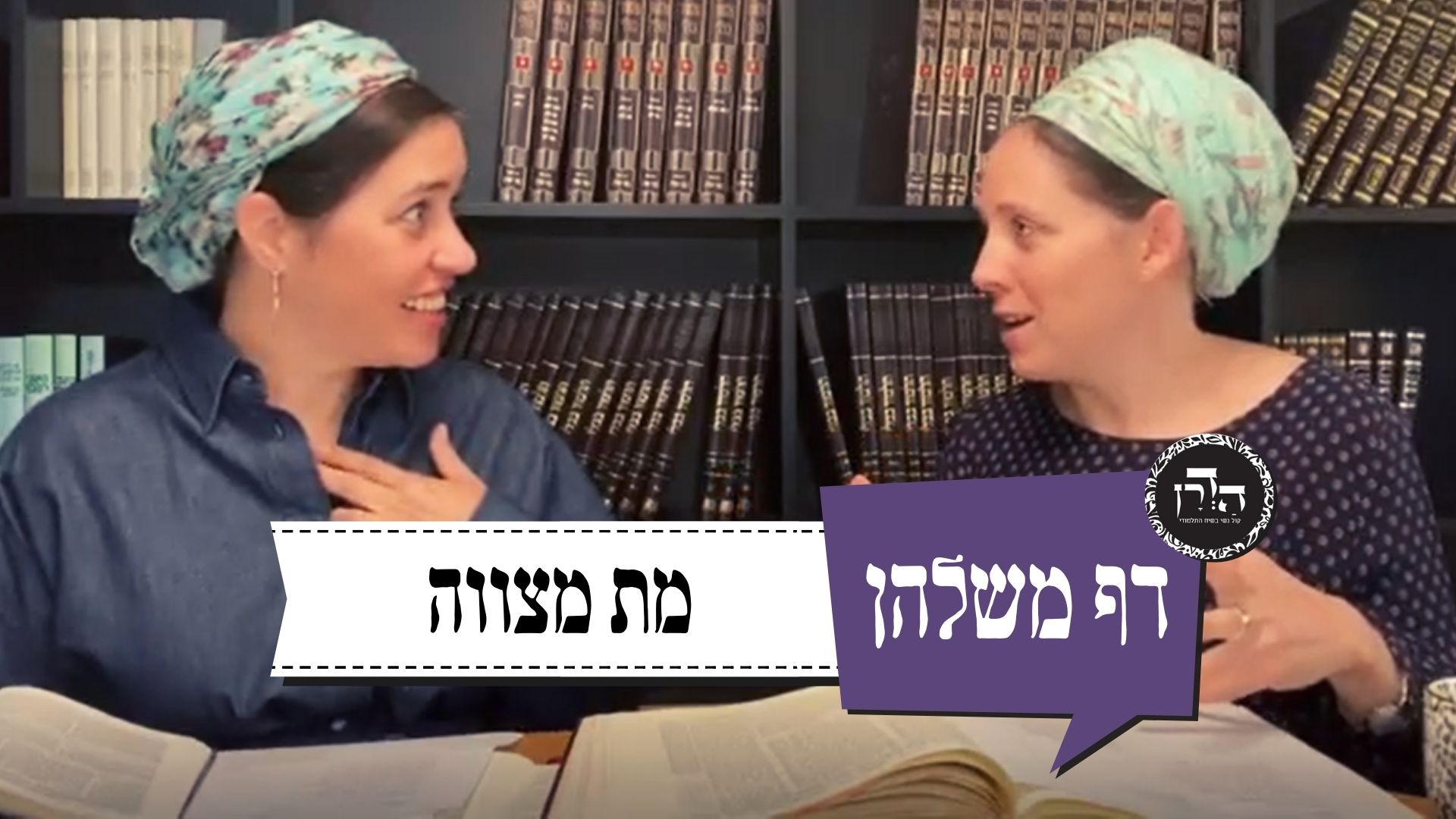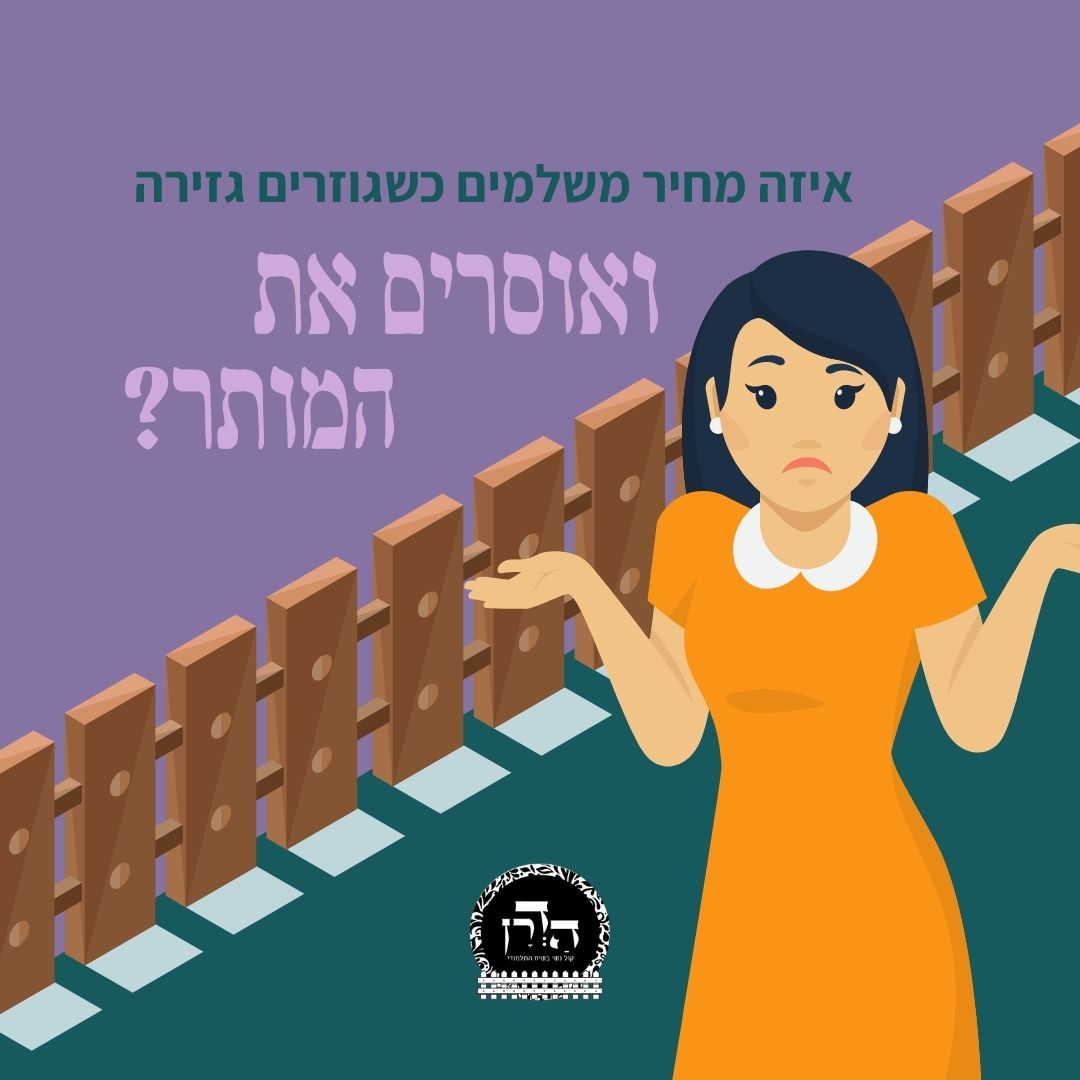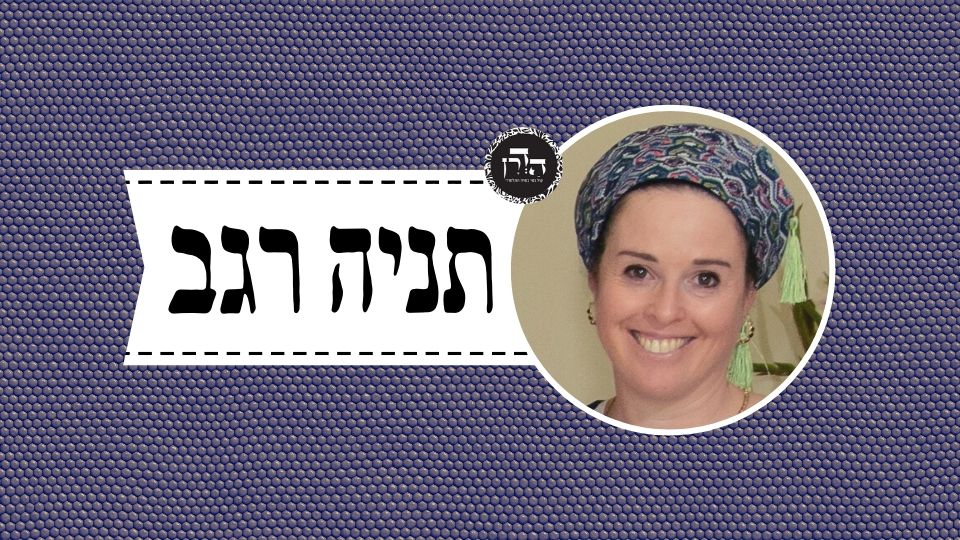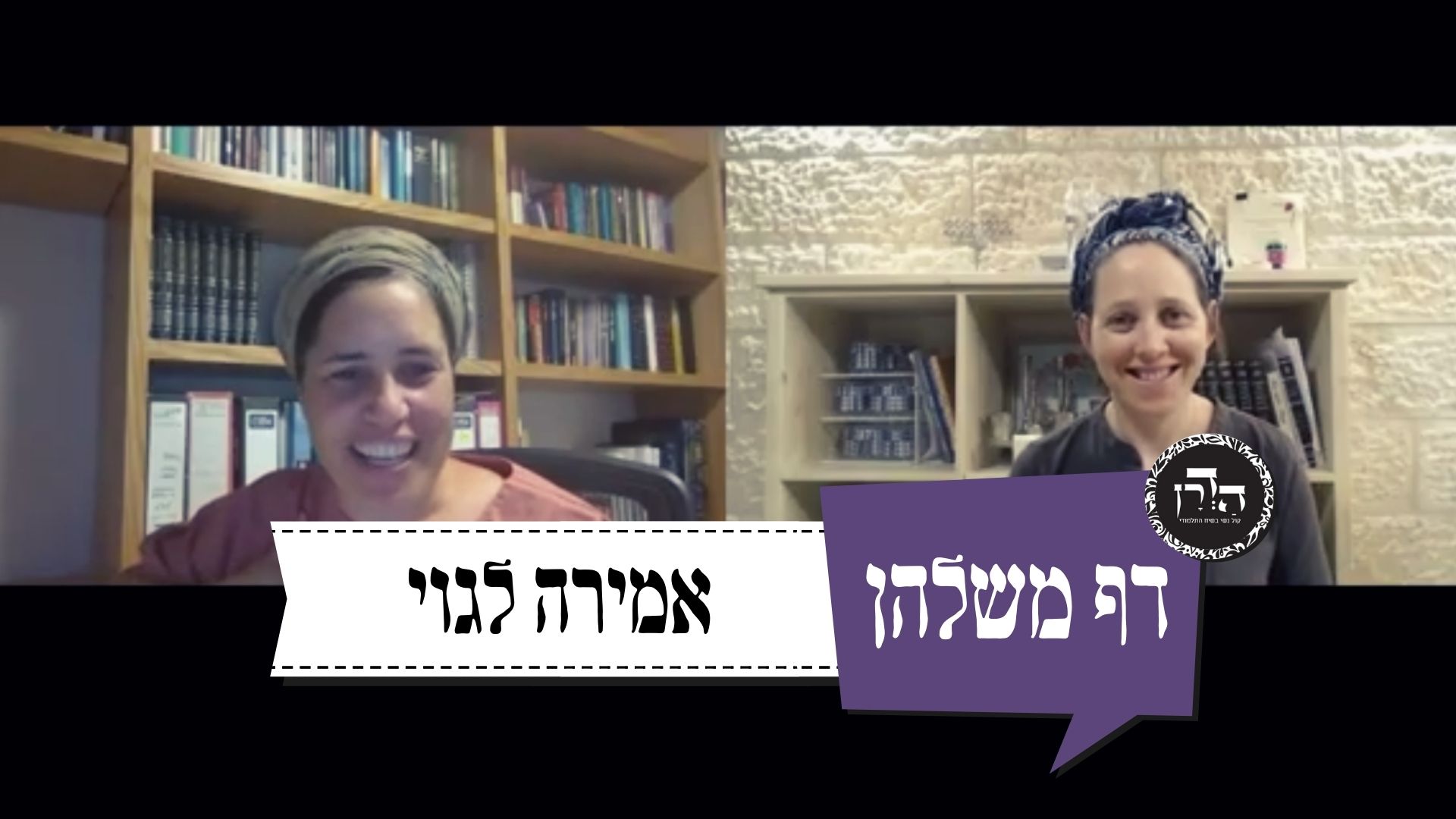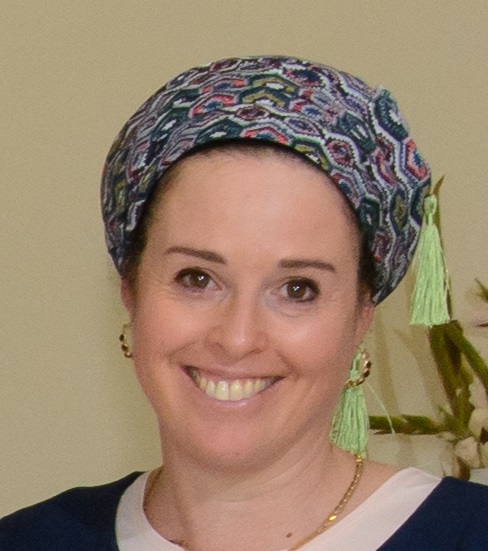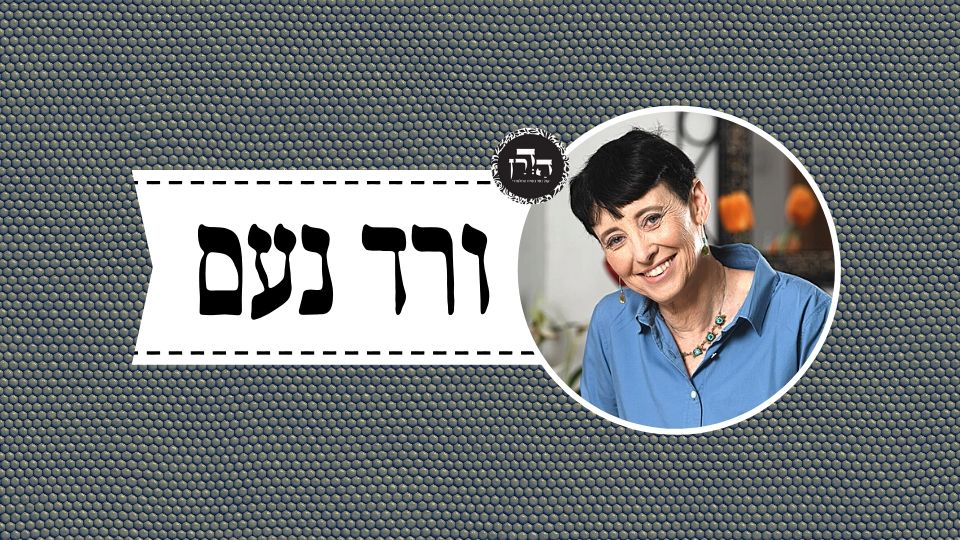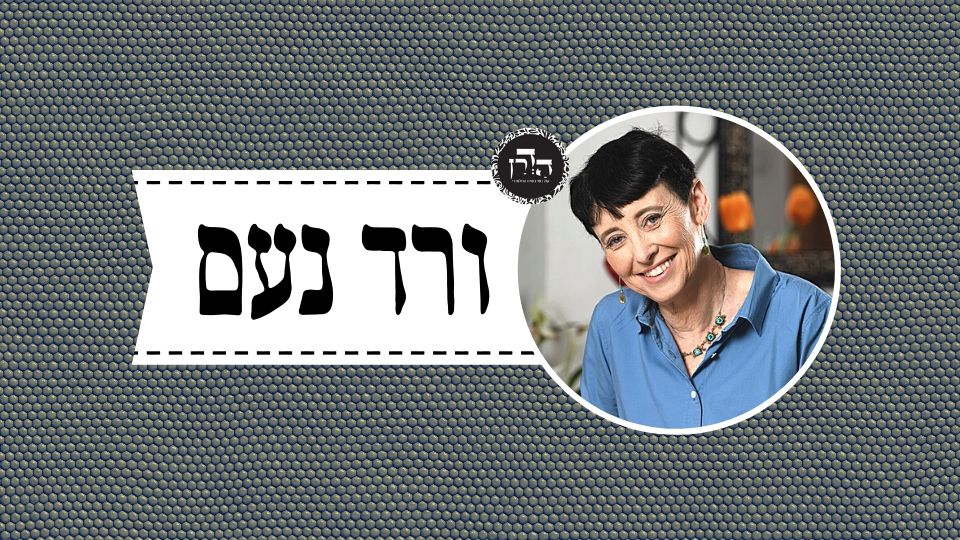שבת ק
לָאו הַיְינוּ הַנָּחָתָן. בָּעֵי רָבָא: אֱגוֹז בִּכְלִי וּכְלִי צָף עַל גַּבֵּי מַיִם — מַהוּ? מִי אָמְרִינַן בָּתַר אֱגוֹז אָזְלִינַן, וְהָא נָיַיח, אוֹ דִילְמָא בָּתַר כְּלִי אָזְלִינַן, וְהָא לָא נָיַיח. תֵּיקוּ.
it is not considered its placement. However, Rava raised a dilemma: In a case where there is a nut in a vessel and the vessel is floating on water, what is the ruling? Is it permitted to lift the nut on Shabbat if one is in another domain? The two sides of the dilemma are: Do we say that we go according to the status of the nut, and it is at rest in the vessel? Or perhaps we go according to the status of the vessel, and it is not at rest. No resolution was found to this dilemma. Therefore, let it stand unresolved as well.
שֶׁמֶן עַל גַּבֵּי יַיִן, מַחֲלוֹקֶת רַבִּי יוֹחָנָן בֶּן נוּרִי וְרַבָּנַן. דִּתְנַן: שֶׁמֶן שֶׁצָּף עַל גַּבֵּי יַיִן, וְנָגַע טְבוּל יוֹם בַּשֶּׁמֶן — לֹא פָּסַל אֶלָּא שֶׁמֶן. רַבִּי יוֹחָנָן בֶּן נוּרִי אוֹמֵר: שְׁנֵיהֶם חִיבּוּר זֶה לָזֶה.
However, with regard to oil floating on wine, there is a dispute between Rabbi Yoḥanan ben Nuri and the Rabbis. As we learned in a mishna: In the case of oil floating on wine, and one who immersed himself during the day, i.e., one who was impure, immersed himself in a ritual bath, but will not become completely pure until sunset, touched the oil, he invalidated only the oil and not the wine. Rabbi Yoḥanan ben Nuri says: With regard to the two, i.e., the oil and the wine, they are considered to have a connection to each other. Since he made the oil impure, the wine is also impure. Their dispute is whether or not the oil is considered to be placed atop the wine.
אָמַר אַבָּיֵי: בּוֹר בִּרְשׁוּת הָרַבִּים עֲמוּקָּה עֲשָׂרָה וּרְחָבָה שְׁמֹנָה, וְזָרַק לְתוֹכָהּ מַחְצֶלֶת — חַיָּיב. חִילְּקָהּ בְּמַחְצֶלֶת — פָּטוּר. לְאַבָּיֵי דִּפְשִׁיטָא לֵיהּ דְּמַחְצֶלֶת מְבַטְּלָא מְחִיצְתָּא — כׇּל שֶׁכֵּן חוּלְיָא דִּמְבַטְּלָא מְחִיצְתָּא. לְרַבִּי יוֹחָנָן דְּמִיבַּעְיָא לֵיהּ חוּלְיָא, מַחְצֶלֶת פְּשִׁיטָא דְּלָא מְבַטְּלָא מְחִיצְתָּא.
Abaye said: In the case of a pit in the public domain that is ten handbreadths deep and precisely eight handbreadths wide, and one threw a mat into it, he is liable. However, if he divided the pit with a mat that split it in two, each one slightly less than four handbreadths wide, he is exempt because neither part is considered a private domain. The Gemara comments: According to the opinion of Abaye, for whom it is obvious that the mat eliminates the partition of the pit, all the more so that a segment of dirt thrown into a pit that is ten handbreadths deep, rendering it less than ten handbreadths, eliminates the partition, and he has no dilemma with regard to Rabbi Yoḥanan’s case. According to Rabbi Yoḥanan, who raised a dilemma with regard to a segment of dirt, it is obvious that a mat does not eliminate the partition.
וְאָמַר אַבָּיֵי: בּוֹר בִּרְשׁוּת הָרַבִּים עֲמוּקָּה עֲשָׂרָה וּרְחָבָה אַרְבָּעָה מְלֵאָה מַיִם, וְזָרַק לְתוֹכָהּ — חַיָּיב. מְלֵאָה פֵּירוֹת, וְזָרַק לְתוֹכָהּ — פָּטוּר, מַאי טַעְמָא? — מַיִם לָא מְבַטְּלִי מְחִיצְתָּא, פֵּירוֹת מְבַטְּלִי מְחִיצְתָּא. תַּנְיָא נָמֵי הָכִי: הַזּוֹרֵק מִן הַיָּם לְאִיסְרַטְיָא וּמִן הָאִיסְרַטְיָא לַיָּם — פָּטוּר. רַבִּי שִׁמְעוֹן אוֹמֵר: אִם יֵשׁ בִּמְקוֹם שֶׁזָּרַק עָמוֹק עֲשָׂרָה וְרָחָב אַרְבָּעָה — חַיָּיב.
Abaye said: With regard to a pit in the public domain that is ten handbreadths deep and four handbreadths wide and filled with water, and one threw an object into it on Shabbat, one is liable because the pit is considered a private domain. And if the pit was filled with fruit and one threw an object into it, he is exempt. What is the reason for the different rulings? Water is not significant enough to eliminate the partition; fruit eliminates the partition. This was also taught in a baraita: One who throws an object from the sea to the street or from the street to the sea is exempt because the sea is considered a karmelit, and one is not liable according to Torah law in that case. Rabbi Shimon says: If the area in the sea where he threw it is ten handbreadths deep and four handbreadths wide, he is liable, as he is considered as one who threw an object into a private domain. Apparently, the water in the sea does not eliminate the status of a private domain.
מַתְנִי׳ הַזּוֹרֵק אַרְבַּע אַמּוֹת בַּכּוֹתֶל, לְמַעְלָה מֵעֲשָׂרָה טְפָחִים — כְּזוֹרֵק בָּאֲוִיר. לְמַטָּה מֵעֲשָׂרָה טְפָחִים — כְּזוֹרֵק בָּאָרֶץ. הַזּוֹרֵק בָּאָרֶץ אַרְבַּע אַמּוֹת — חַיָּיב.
MISHNA: With regard to one who throws an object four cubits in the public domain, if the object hits the wall above ten handbreadths from the ground, which is an exempt domain, it is as if one threw it in the air, and he is exempt. If it hits the wall below ten handbreadths from the ground, it is as if he threw it and it landed on the ground, and one who throws an object four cubits and it lands on the ground is liable.
גְּמָ׳ וְהָא לָא נָח? אָמַר רַבִּי יוֹחָנָן: בִּדְבֵילָה שְׁמֵינָה שָׁנִינוּ.
GEMARA: We learned in the mishna that if one throws an object in the public domain a distance of four cubits and it hits a wall above ten handbreadths from the ground, he is liable if he threw it. The Gemara asks: And we discussed it: How could he be liable for carrying in that case? Since the object did not come to rest on the wall, there was no placement. And Rabbi Yoḥanan said: It is with regard to the case of a juicy cake of figs that sticks to the wall when thrown against it that we learned in the mishna.
אָמַר רַב יְהוּדָה, אָמַר רַב, אָמַר רַבִּי חִיָּיא: זָרַק לְמַעְלָה מֵעֲשָׂרָה, וְהָלְכָה וְנָחָה בְּחוֹר כׇּל שֶׁהוּא, בָּאנוּ לְמַחְלוֹקֶת רַבִּי מֵאִיר וְרַבָּנַן. לְרַבִּי מֵאִיר דְּאָמַר חוֹקְקִין לְהַשְׁלִים — מִיחַיַּיב. לְרַבָּנַן דְּאָמְרִי אֵין חוֹקְקִין לְהַשְׁלִים — לָא מִיחַיַּיב. תַּנְיָא נָמֵי הָכִי: זָרַק לְמַעְלָה מֵעֲשָׂרָה, וְהָלְכָה וְנָחָה בְּחוֹר כׇּל שֶׁהוּא — רַבִּי מֵאִיר מְחַיֵּיב וַחֲכָמִים פּוֹטְרִין.
Rav Yehuda said that Rav said that Rabbi Ḥiyya said: If one threw a stone at a wall above ten handbreadths from the ground, and it went and came to rest in a hole in the wall of any size less than four handbreadths, we have come to the dispute between Rabbi Meir and the Rabbis. According to the opinion of Rabbi Meir, who said: One carves out the space to complete it, he is liable. We complete the hole by conceptually carving it to four handbreadths because doing so is theoretically possible. Since the hole is considered ten handbreadths high and four handbreadths wide, one is liable for transferring an object from a public domain to a private one. According to the opinion of the Rabbis, who say: One does not carve out the space to complete it, the thrower is not liable because the hole is actually less than four handbreadths wide at present. That was also taught in a baraita: If one threw an object above ten handbreadths, and it went and came to rest in a small hole, Rabbi Meir deems him liable, while the Rabbis deem him exempt.
אָמַר רַב יְהוּדָה אָמַר רַב: תֵּל הַמִּתְלַקֵּט עֲשָׂרָה מִתּוֹךְ אַרְבַּע, וְזָרַק וְנָח עַל גַּבָּיו — חַיָּיב. תַּנְיָא נָמֵי הָכִי: מָבוֹי שֶׁשָּׁוָה לְתוֹכוֹ, וְנַעֲשָׂה מִדְרוֹן לִרְשׁוּת הָרַבִּים, אוֹ שָׁוָה לִרְשׁוּת הָרַבִּים וְנַעֲשָׂה מִדְרוֹן לְתוֹכוֹ — אוֹתוֹ מָבוֹי אֵינוֹ צָרִיךְ לֹא לֶחִי וְלֹא קוֹרָה. רַבִּי חֲנִינָא בֶּן גַּמְלִיאֵל אוֹמֵר: תֵּל הַמִּתְלַקֵּט עֲשָׂרָה מִתּוֹךְ אַרְבַּע, וְזָרַק וְנָח עַל גַּבָּיו — חַיָּיב.
Rav Yehuda said that Rav said: In the case of a mound that is an inclined plane that gradually attains a height of ten handbreadths over a horizontal space of four cubits, and one threw an object from the public domain and it came to rest atop that mound, he is liable because it is considered a partition. That was also taught in a baraita: An alleyway that is level inside and becomes an inclined or declined plane as it enters the public domain, which is higher or lower than the alleyway, or if the entrance to the alleyway is level when entering the public domain and inside it is inclined, that alleyway requires neither a post alongside its entrance or a beam across its entrance in order to distinguish it from the public domain because the incline itself is considered a partition. Rabbi Ḥanina ben Gamliel says: In the case of a mound that gradually attains a height of ten handbreadths over a horizontal space of four cubits, and one threw an object from the public domain and it came to rest atop that mound, he is liable.
מַתְנִי׳ זָרַק לְתוֹךְ אַרְבַּע אַמּוֹת וְנִתְגַּלְגֵּל חוּץ לְאַרְבַּע אַמּוֹת — פָּטוּר. חוּץ לְאַרְבַּע אַמּוֹת וְנִתְגַּלְגֵּל לְתוֹךְ אַרְבַּע אַמּוֹת — חַיָּיב.
MISHNA: If one threw an object in the public domain, intending for it to land within four cubits, meaning that he had no intention of violating the Torah prohibition of carrying, and the object rolled and went beyond four cubits, he is exempt. However, if one threw an object with the intention of it landing beyond four cubits, and the object rolled back within four cubits, he is liable from when he originally threw the object.
גְּמָ׳ וְהָא לָא נָח? אָמַר רַבִּי יוֹחָנָן: וְהוּא שֶׁנָּח עַל גַּבֵּי מַשֶּׁהוּ. תַּנְיָא נָמֵי הָכִי: זָרַק חוּץ לְאַרְבַּע אַמּוֹת וּדְחָפַתּוּ הָרוּחַ וְהִכְנִיסַתּוּ, וְאַף עַל פִּי שֶׁחָזְרָה וְהוֹצִיאַתּוּ — פָּטוּר. אֲחָזַתּוּ הָרוּחַ מַשֶּׁהוּ, אַף עַל פִּי שֶׁחָזְרָה וְהִכְנִיסַתּוּ — חַיָּיב.
GEMARA: We learned in the mishna that if one threw an object beyond four cubits and it rolled back within four cubits, he is liable. The Gemara asks: The object did not come to rest beyond four cubits, so how can the one who threw it be liable? Rabbi Yoḥanan said: And that liability was established when the object came to rest atop something. That was also taught in a baraita: If one threw an object beyond four cubits and the wind blew it while still in the air and brought it within four cubits, he is exempt even though it, i.e., the wind, then brought it back out because the object did not come to rest in the place where it was thrown. However, if the wind seized it briefly and it stayed on the ground for a brief period of time (Tosafot), even though the wind then brought it in, the individual is liable.
אָמַר רָבָא: תּוֹךְ שְׁלֹשָׁה לְרַבָּנַן צָרִיךְ הַנָּחָה עַל גַּבֵּי מַשֶּׁהוּ. יָתֵיב מָרִימָר וְקָאָמַר לַהּ לְהָא שְׁמַעְתָּא. אֲמַר לֵיהּ רָבִינָא לְמָרִימָר:
Rava said: Despite the principle of lavud, which states that within three handbreadths of the ground an object is considered to be attached to it, according to the Rabbis, who maintain that an object in airspace is not considered at rest, the object must come to rest atop something to establish liability. The Gemara relates that Mareimar sat and stated this halakha. Ravina said to Mareimar:
לָאו הַיְינוּ מַתְנִיתִין, וְאָמַר רַבִּי יוֹחָנָן: וְהוּא שֶׁנָּח עַל גַּבֵּי מַשֶּׁהוּ. אֲמַר לֵיהּ: מִתְגַּלְגֵּל קָאָמְרַתְּ — מִתְגַּלְגֵּל אֵין סוֹפוֹ לָנוּחַ, אֲבָל הַאי כֵּיוָן דְּסוֹפוֹ לָנוּחַ, אַף עַל גַּב דְּלָא נָח — כְּמַאן דְּנָח דָּמֵי, קָא מַשְׁמַע לַן.
Isn’t that what we learned in the mishna, with regard to which Rabbi Yoḥanan said: That liability is when it came to rest atop something, which means that the object must actually land in order for the one who threw it to be liable. Mareimar said to Ravina: Are you saying it is a case of rolling? One cannot cite proof from a rolling object because a rolling object will not ultimately come to rest. However, with regard to this object, which passed within three handbreadths of the ground, I would say: Since it will ultimately come to rest, even though it has not yet come to rest, it is considered as an object that came to rest. Therefore, Rava teaches us that even in that case one is not liable until it actually comes to rest upon something.
מַתְנִי׳ הַזּוֹרֵק בַּיָּם אַרְבַּע אַמּוֹת — פָּטוּר. אִם הָיָה רְקַק מַיִם, וּרְשׁוּת הָרַבִּים מְהַלֶּכֶת בּוֹ, הַזּוֹרֵק לְתוֹכוֹ אַרְבַּע אַמּוֹת — חַיָּיב. וְכַמָּה הוּא רְקַק מַיִם — פָּחוֹת מֵעֲשָׂרָה טְפָחִים. רְקַק מַיִם וּרְשׁוּת הָרַבִּים מְהַלֶּכֶת בּוֹ, הַזּוֹרֵק בְּתוֹכוֹ אַרְבַּע אַמּוֹת — חַיָּיב.
MISHNA: One who throws an object four cubits into the sea is exempt. If there was a swamp and the public domain passes through it, one who throws an object four cubits into it is liable like one who carried four cubits in the public domain. And how deep is this swamp? It is less than ten handbreadths deep. In the case of a swamp that the public domain passes through, one who throws an object four cubits into the swamp is liable.
גְּמָ׳ אֲמַר לֵיהּ הָהוּא מֵרַבָּנַן לְרָבָא: בִּשְׁלָמָא ״הִילּוּךְ״ ״הִילּוּךְ״ תְּרֵי זִימְנֵי, הָא קָא מַשְׁמַע לַן: הִילּוּךְ עַל יְדֵי הַדְּחָק — שְׁמֵיהּ הִילּוּךְ, תַּשְׁמִישׁ עַל יְדֵי הַדְּחָק — לָא שְׁמֵיהּ תַּשְׁמִישׁ. אֶלָּא ״רְקָק״ ״רְקָק״ תְּרֵי זִימְנֵי לְמָה לִי? חַד בִּימוֹת הַחַמָּה וְחַד בִּימוֹת הַגְּשָׁמִים. וּצְרִיכִי. דְּאִי תְּנָא חֲדָא, הֲוָה אָמֵינָא הָנֵי מִילֵּי בִּימוֹת הַחַמָּה, דַּעֲבִידִי אִינָשֵׁי דִּמְסַגִּי לְאֹקוֹרֵי נַפְשַׁיְיהוּ, אֲבָל בִּימוֹת הַגְּשָׁמִים — לָא. וְאִי אַשְׁמְעִינַן בִּימוֹת הַגְּשָׁמִים, דְּכֵיוָן דְּמִיטַּנְּפִי לָא אִיכְפַּת לְהוּ, אֲבָל בִּימוֹת הַחַמָּה — לָא.
GEMARA: One of the Sages said to Rava: Granted, passing passing is mentioned twice in the mishna; this teaches us that passage under duress is considered passage, but usage under duress is not considered usage. But why do I need it to mention swamp swamp twice? Rava answered him: One case is referring to the summer, and one case is referring to the winter. And both cases are necessary, as had the mishna taught only one mention of swamp, I would have said that these matters, i.e., cases indicating that passage under duress is considered passage, apply only in the summer because people commonly pass through the swamp to cool themselves; however, in the winter I would have thought that it would not be so. And had the mishna taught us only the case of winter, I would have said that since they are filthy from mud anyway, they do not mind walking through the swamp, but in the summer it would not be so.
אַבָּיֵי אֲמַר: אִיצְטְרִיךְ, סָלְקָא דַּעְתָּךְ אָמֵינָא הָנֵי מִילֵּי הֵיכָא דְּלָא הָוֵי אַרְבַּע אַמּוֹת, אֲבָל הֵיכָא דְּהָוֵי אַרְבַּע אַמּוֹת — אַקּוֹפֵי מַקְּפִי לֵיהּ.
Abaye said: It is possible to explain this other way. It was necessary for the mishna to state swamp twice because it would have entered your mind to say that these matters apply specifically where the swamp is not four cubits wide because then people walk through the swamp and do not circumvent it, but where the swamp is four cubits wide, people circumvent it. Therefore, it was necessary to teach that people walk through swamps that are both narrow and wide.
רַב אָשֵׁי אָמַר: אִיצְטְרִיךְ, סָלְקָא דַּעְתָּךְ אָמֵינָא הָנֵי מִילֵּי הֵיכָא דַּהֲוַאי אַרְבָּעָה, אֲבָל הֵיכָא דְּלָא הֲוַאי אַרְבָּעָה — מִיפְסָע פָּסְעִי לֵיהּ. וְאַזְדָּא רַב אָשֵׁי לְטַעְמֵיהּ, דְּאָמַר רַב אָשֵׁי: הַאי מַאן דְּזָרֵיק וְנָח אַגּוּדָּא דְגַמְלָא — מִיחַיַּיב, שֶׁהֲרֵי רַבִּים בּוֹקְעִין בּוֹ.
Rav Ashi said another explanation: It was necessary for the mishna to state swamp twice because it would have entered your mind to say that these matters apply specifically where the swamp is at least four handbreadths wide, but where the swamp is not four handbreadths wide, people step over it and do not walk through it. The Gemara comments: And Rav Ashi follows his own reasoning, as Rav Ashi said: One who threw an object and it came to rest on one of the beams of a bridge is liable. Even though the width of each beam is less than four handbreadths, it joins together with the other beams to form a single surface of the public domain because even though many people step over the beams, still many people step on it.
מַתְנִי׳ הַזּוֹרֵק מִן הַיָּם לַיַּבָּשָׁה, וּמִן הַיַּבָּשָׁה לַיָּם, וּמִן הַיָּם לַסְּפִינָה, וּמִן הַסְּפִינָה לַיָּם, וּמִן הַסְּפִינָה לַחֲבֶירְתָּהּ — פָּטוּר. סְפִינוֹת קְשׁוּרוֹת זוֹ בָּזוֹ — מְטַלְטְלִין מִזּוֹ לָזוֹ. אִם אֵינָן קְשׁוּרוֹת, אַף עַל פִּי שֶׁמּוּקָּפוֹת — אֵין מְטַלְטְלִין מִזּוֹ לָזוֹ.
MISHNA: One who throws an object from the sea to dry land, or from dry land to the sea, or from the sea onto a boat, or from a boat into the sea, or from one boat to another is exempt because the sea has the legal status of a karmelit. If boats are tied together, one may carry an object from one to the other on Shabbat. However, if they are not tied, even though they are adjacent, one may not carry from one to the other.
גְּמָ׳ אִיתְּמַר: סְפִינָה, רַב הוּנָא אָמַר: מוֹצִיאִין הֵימֶנָּה זִיז כׇּל שֶׁהוּא וּמְמַלֵּא. רַב חִסְדָּא וְרַבָּה בַּר רַב הוּנָא אָמְרִי: עוֹשֶׂה מְקוֹם אַרְבָּעָה וּמְמַלֵּא.
GEMARA: It was stated that the Sages disagreed with regard to the manner in which one may draw seawater onto a boat on Shabbat. Rav Huna said: One extends a projection of any size from the side of the boat as a distinctive sign, and fills a receptacle with water from the sea. Rav Ḥisda and Rabba bar Rav Huna say: One creates an area, a frame of four by four handbreadths, and fills the water from inside it.
רַב הוּנָא אָמַר מוֹצִיא הֵימֶנָּה זִיז כׇּל שֶׁהוּא וּמְמַלֵּא, קָסָבַר כַּרְמְלִית מֵאַרְעָא מָשְׁחִינַן וְאַוֵּירָא מְקוֹם פְּטוּר הוּא, וּבְדִין הוּא דְּזִיז נָמֵי לָא לִיבְעֵי, אֶלָּא — כִּי הֵיכִי דְּלֶיהְוֵי לֵיהּ הֶיכֵּרָא.
The Gemara explains: Rav Huna, who said that one extends a projection of any size and fills a receptacle with water, maintains that we measure the karmelit from the sea floor. Since the sea itself is deeper than ten handbreadths, the boat is considered to be floating in the air, and the air is an exempt domain, as it is above ten handbreadths from the ground of the karmelit. And by law one should not require a projection because he is drawing water from an exempt domain into a private domain, which is permitted ab initio. Rather, the reason a projection is required is so that he will have a distinctive sign and not come to draw water from a karmelit into a private domain.
רַב חִסְדָּא וְרַבָּה בַּר רַב הוּנָא אָמְרִי עוֹשֶׂה מְקוֹם אַרְבָּעָה וּמְמַלֵּא, קָסָבְרִי כַּרְמְלִית מִשְּׂפַת מַיָּא מָשְׁחִינַן — מַיָּא אַרְעָא סְמִיכְתָּא, אִי לָא עָבֵיד מְקוֹם אַרְבָּעָה — קָא מְטַלְטֵל מִכַּרְמְלִית לִרְשׁוּת הַיָּחִיד.
Rav Ḥisda and Rabba bar Rav Huna say: One creates an area, a frame of four by four handbreadths, and fills a receptacle with water. They maintain that we measure the karmelit from the surface of the water, and the water in the sea has a legal status like that of solid land. Therefore, if one does not create an area of four by four, he will carry from a karmelit to the private domain.
אֲמַר לֵיהּ רַב נַחְמָן לְרַבָּה בַּר אֲבוּהּ: וּלְרַב הוּנָא דְּאָמַר מוֹצִיא הֵימֶנָּה זִיז כׇּל שֶׁהוּא וּמְמַלֵּא, זִימְנִין דְּלֵיכָּא עֲשָׂרָה, וְקָא מְטַלְטֵל מִכַּרְמְלִית לִרְשׁוּת הַיָּחִיד! אֲמַר לֵיהּ: גָּמְרִינַן דְּאֵין סְפִינָה מְהַלֶּכֶת בְּפָחוֹת מֵעֲשָׂרָה. וְהָא מוּרְשָׁא אִית לַהּ! אָמַר רַב סָפְרָא: גָּשׁוֹשֵׁי אָזְלִי קַמַּהּ.
Rav Naḥman said to Rabba bar Avuh: And according to Rav Huna, who said that one extends a projection of any size from the side of the boat and fills a receptacle with water, isn’t there room for concern that at times when the water is not ten handbreadths deep, he will carry from a karmelit into the private domain? He said to him: We learned through tradition that a boat does not travel in water that is less than ten handbreadths deep. He asks: Although a boat has a protrusion at its bow is more than ten handbreadths above the sea floor, the entire length of the boat is not necessarily that far above the bottom. Rav Safra said: Those people who measure the depth of the water with long poles proceed before the ship and ensure that that the water is at least ten handbreadths deep.
אֲמַר לֵיהּ רַב נַחְמָן בַּר יִצְחָק לְרַב חִיָּיא בַּר אָבִין: לְרַב חִסְדָּא וּלְרַבָּה בַּר רַב הוּנָא דְּאָמְרִי עוֹשֶׂה מְקוֹם אַרְבָּעָה וּמְמַלֵּא, שׁוֹפְכִין דִּידֵיהּ הֵיכִי שָׁדֵי לְהוּ? וְכִי תֵּימָא דְּשָׁדֵי לְהוּ בְּאוֹתוֹ מָקוֹם — מְאִיסִי לֵיהּ. דְּשָׁדֵי לְהוּ אַדֻּפְנָא דִסְפִינָה. וְהָא אִיכָּא כֹּחוֹ! כֹּחוֹ בְּכַרְמְלִית לָא גְזַרוּ. וּמְנָא תֵּימְרָא? דְּתַנְיָא: סְפִינָה אֵין מְטַלְטְלִין לֹא מִתּוֹכָהּ לַיָּם וְלֹא מִן הַיָּם לְתוֹכָהּ,
Rav Naḥman bar Yitzḥak said to Rav Ḥiyya bar Avin: According to Rav Ḥisda and Rabba bar Rav Huna, who say that in order to draw water onto a boat on Shabbat one creates an area of four by four handbreadths and fills a receptacle, how does he throw out his waste water? And if you say he pours it out in the same area from which he draws water, the water that he subsequently draws from there will be disgusting to him. Rav Ḥiyya bar Avin answered him: He pours it onto the side of the boat from which it runs into the sea, and he does not pour it directly into the sea. The Gemara asks: Even so, it is accomplished by means of his power. Although he did not pour it directly, he caused the waste water to enter the sea. The Gemara answers: The Sages did not issue a decree to prohibit an action performed by one’s power in a karmelit. They only prohibited throwing an object directly. And from where do you say that this is so? As it was taught in a baraita: With regard to a ship, one may neither carry from it into the sea, nor from the sea into it.







